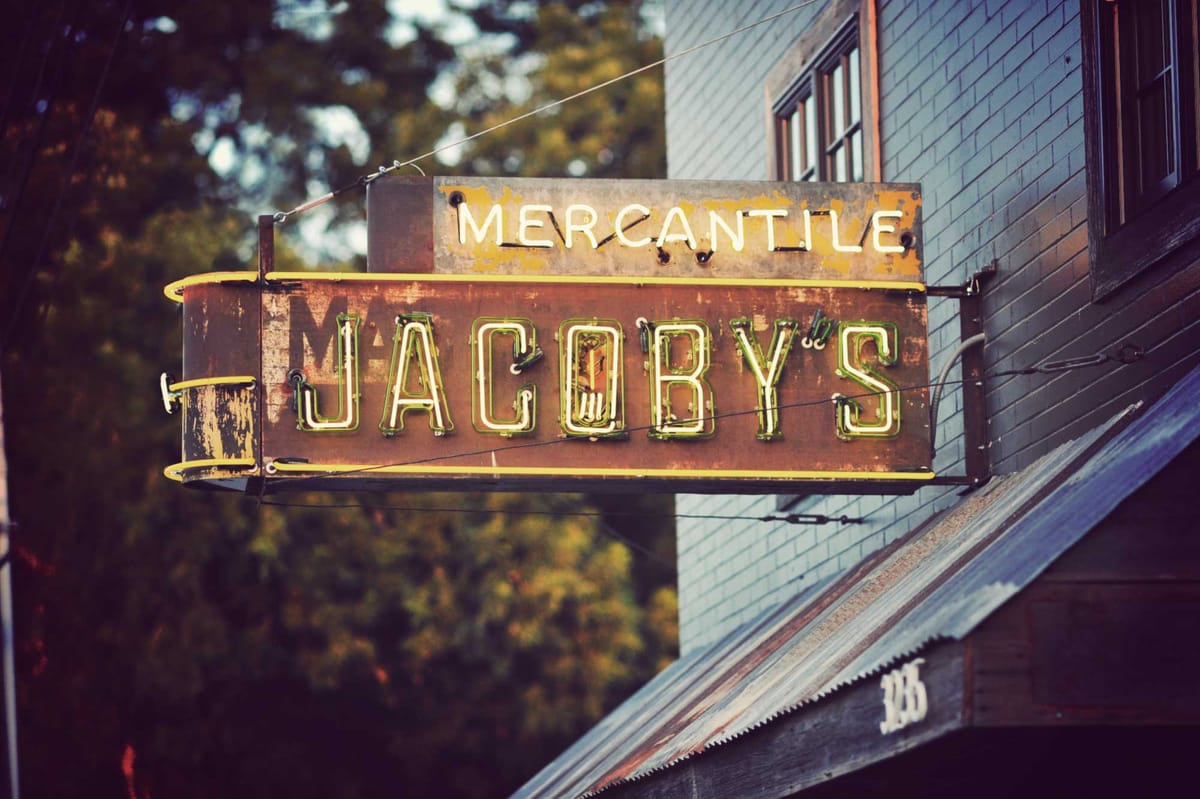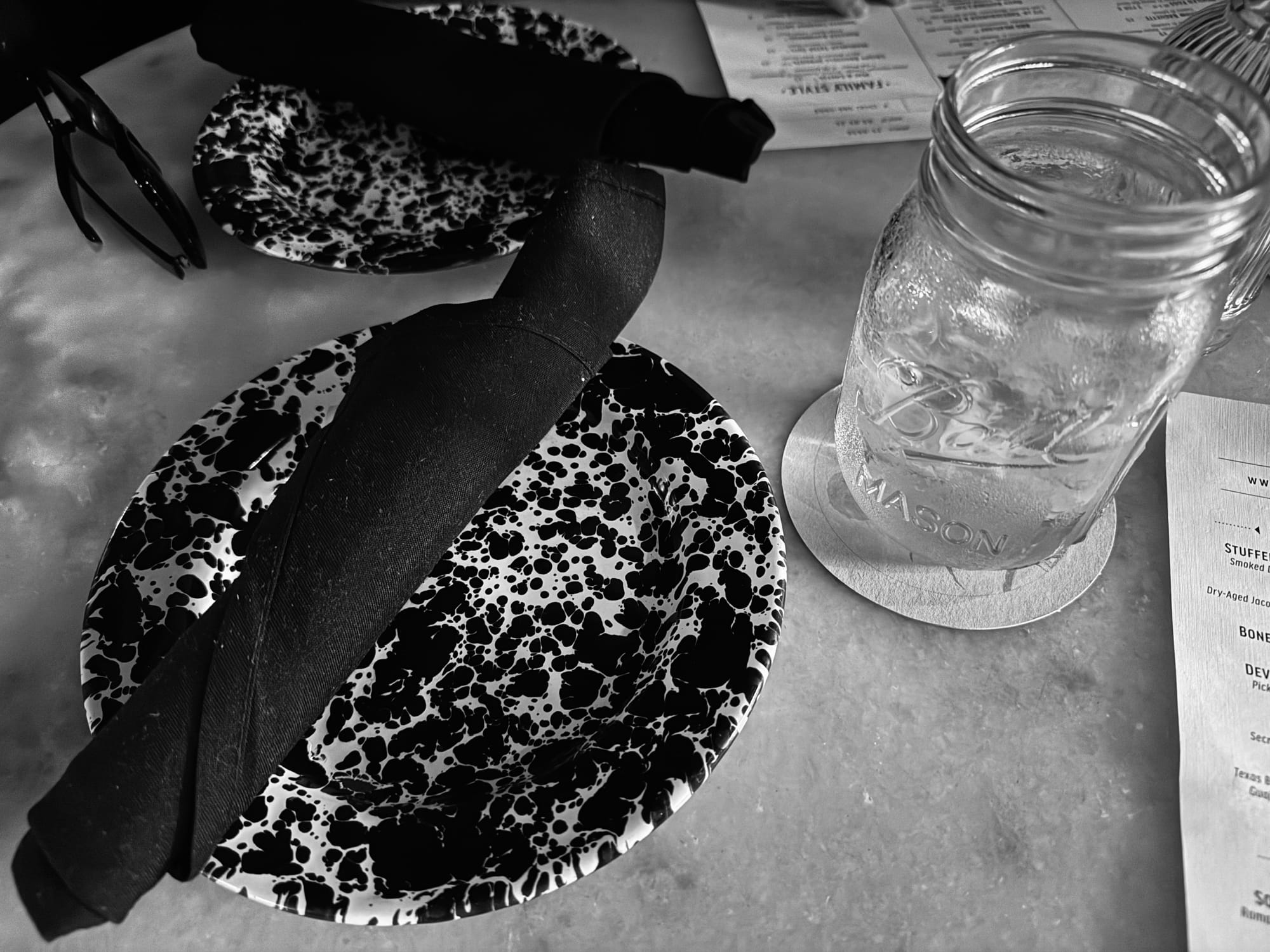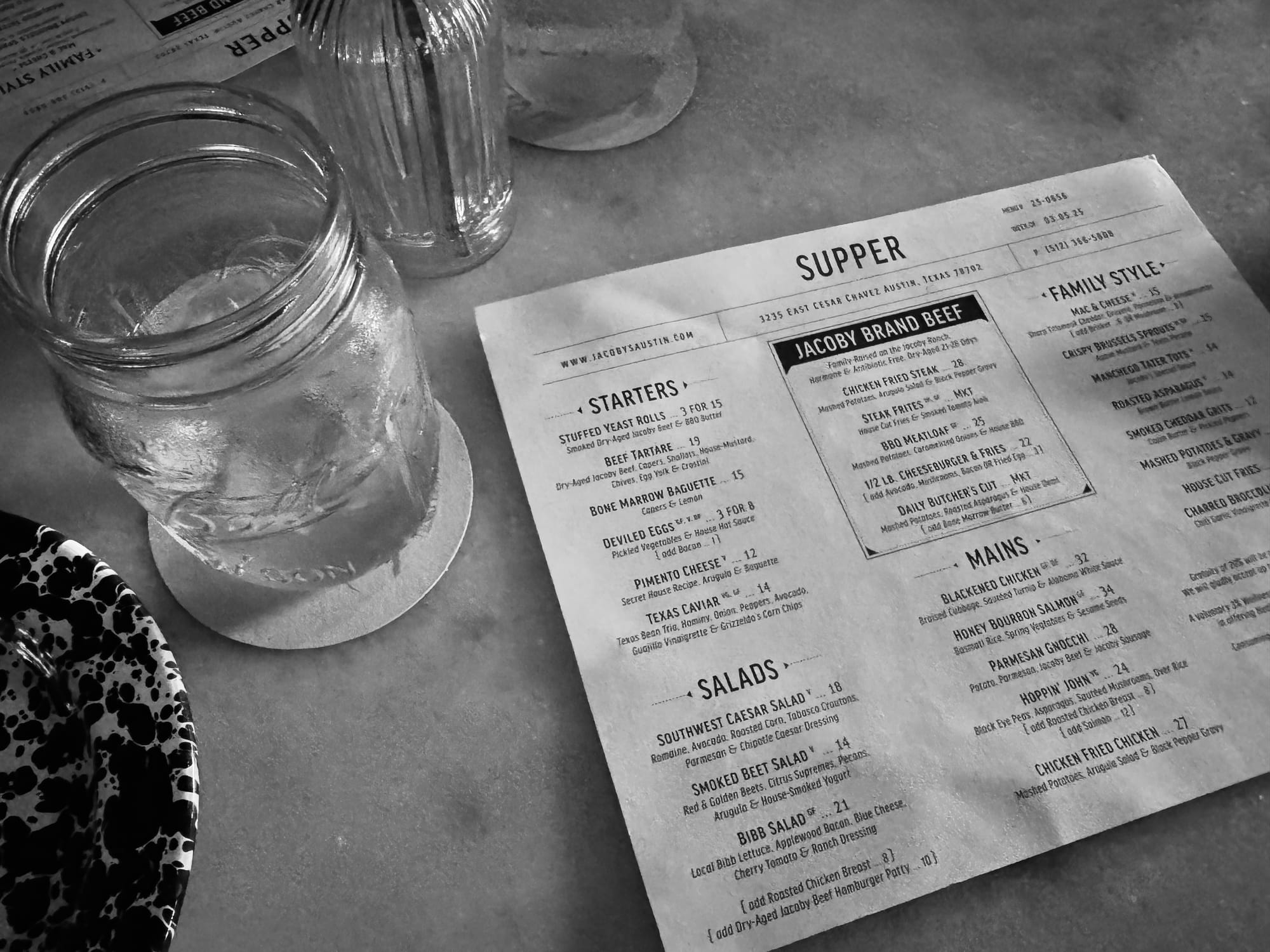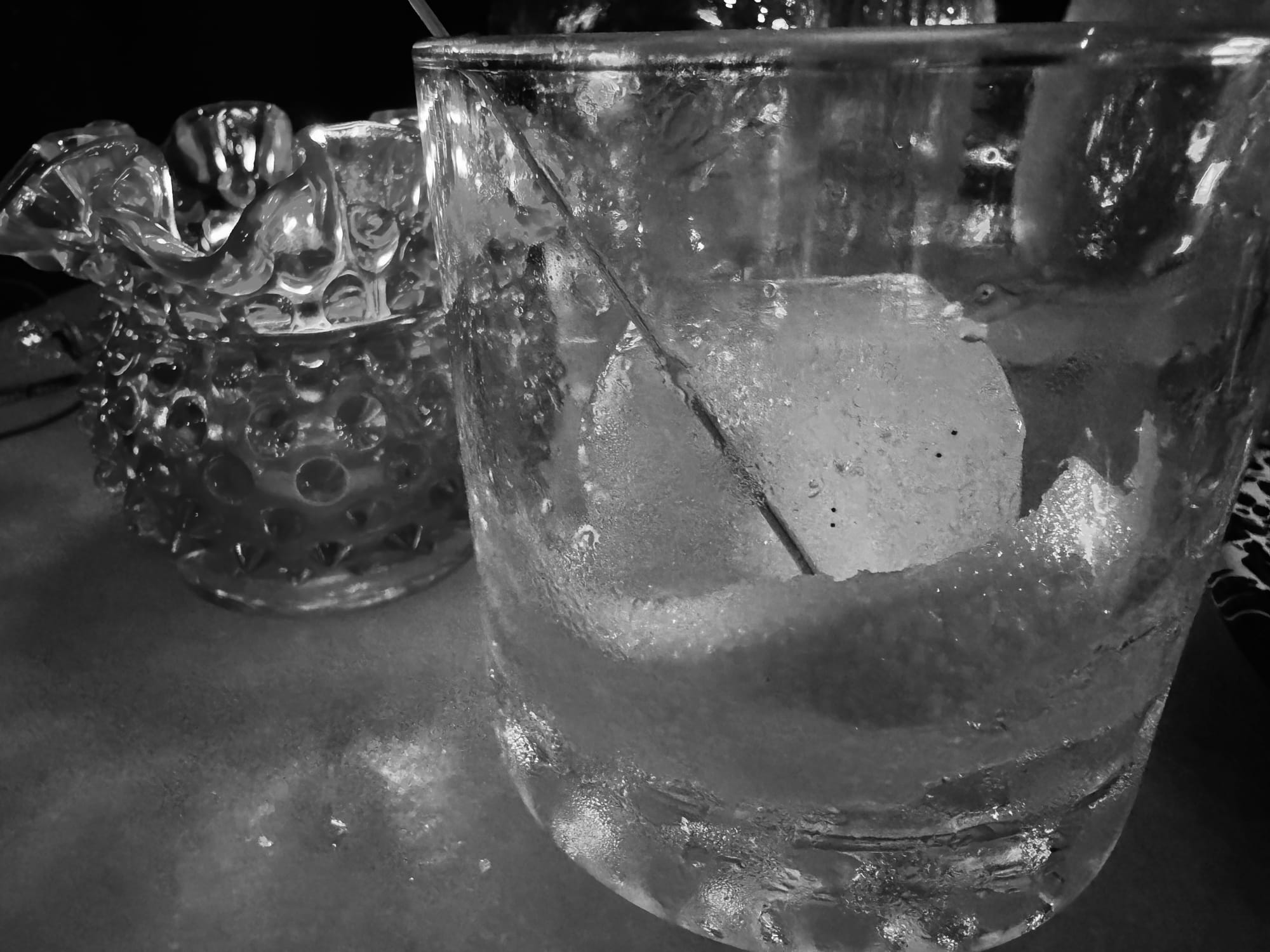Four Hours at Jacoby's

On friendship, fate, and existential nihilism
Every time I drive somewhere in Austin, it feels a little like visiting a childhood home and finding it now serves poke bowls and bespoke dog treats. The city is growing, the roads are getting wider, and what used to be sleepy two-lane drags are now roaring 75-mile-per-hour thoroughfares with exit ramps that seem to launch you into the next decade. I had occasion this weekend to see just how much had changed as my wife and I headed south on the newly expanded 183 to meet friends for dinner. Our destination was Jacoby’s Restaurant and Mercantile, located on East East Cesar Chavez Street—a name so nice, they directionalized it twice.
I had expected dusty lots and abandoned gas stations, but what we found instead was a lively nightspot, a wild tangle of bars, restaurants, and the skeletal remains of textile factories, all pulsing with the misplaced energy of people who should probably be heading home soon. It was 6:15 p.m. after all; time to get home and get the kids fed and into bed.
From the outside, Jacoby’s strikes the tone of a humble, down-home eatery—rustic wood, weathered signage, a porch fit for sweet tea and grudges. That illusion dissolves the moment you pull in and find valet-only parking, because if there’s one thing Austin does better than barbecue, it’s trying to be like Dallas.
We were meeting our friends, Jimmy and Cecilia, with whom we have a standing quarterly appointment to discover new-to-us restaurants like Jacoby's, Hestia, and Fonda San Miguel. What brought us to Jacoby's was the promise of a to-die-for burger, but what we ended up with was a bawdy waiter, gourmet food at gourmet prices, and a surprisingly deep plunge into existential nihilism—the sort of conversation you have when the cocktails are strong, the chairs are padded, and there's nowhere else you'd rather be.

The Man From Georgia
It’s always funny to walk up to a hostess stand, announce your name, and then immediately apologize for being ten minutes late—as if your dinner reservation were a court date and you were prepared to be held in contempt. Personally, I can’t stand being late to anything–even if I were on death row, I'd be standing at my cell door 45 minutes before I was to be taken to the gas chamber.
But lately, I’ve been working on being Cool Daniel, the kind of man who shrugs at the clock and lets the chips fall where they may, assuming they fall into a tidy, prearranged stack.
We were rewarded for our almost-punctuality with a prime table: a half booth tucked away in the back corner, safely removed from the chaos of the bar and the swinging doors of the kitchen. Dom and Cecilia claimed the cushioned bench along the wall, while Jimmy and I took the standard-issue wooden chairs that restaurants give to men, as if assuming we are harder to ruin.
Before we could even exchange pleasantries, The Man from Georgia descended upon us. From this point forward, I will refer to him simply as The Man—out of respect, fear, and his own plausible deniability.
The Man wasted no time launching into the drink menu, tapping the laminated page with a thick finger as he pointed out the cocktails he deemed “bomb as fuck.” He spoke with the urgency of a man who knew the longer we stayed sober, the more time we had to change our minds about being there at all.
He tried—successfully, I might add—to upsell Dom on adding a shot to her cocktail. She hesitated, weighing the options like a woman considering both the calories and the $8 surcharge, until I leaned in and goaded her into it. Check be damned. That was Future Daniel’s problem. And honestly, that guy's kind of a drag.
Appetizers arrived almost as soon as the drinks did: deviled eggs so smooth they could have given a TED talk, filled yeast rolls that practically sighed when you bit into them, and Mexican ceviche so fresh it felt mildly rude to eat it. We always order a little of everything on a first visit, partly to maximize the experience, and partly because we are still pretending we might someday make adult decisions about our cholesterol.
Dinner was a parade of comfort foods executed at a frankly suspicious level of quality: steaks, burgers, chicken fried steaks, mac and cheese, Manchego tater tots. Every bite was a promise that I would not be sleeping well that night, nor buttoning any pants without the assistance of mechanical force.
By the midpoint of my main course, the buttons on my shirt were hanging on for dear life. Somewhere deep inside me, a structural engineer was running calculations and silently weeping. Spanx was going to get an angry letter from me—assuming I survived dessert.
Our conversation was exactly what you hope for when you see your friends: light, entertaining, hilarious, honest. We talked about kids, work, TV shows, and the unique joy of seeing your own pettiness reflected in your child’s behavior.
It was, by all accounts, a perfect dinner. And then, without warning and despite years of experience telling me not to, I made the fateful decision to “get dark as fuck.”

The Dark Place
It all started innocently enough, as these things often do, with stories about the accidental racism of our children. Cecilia’s son had asked a question at school that, while technically innocent, managed to mortify her to the core upon hearing about it. Our son, not to be outdone, had loudly asked in a Hobby Lobby why some people were "speaking non-English in an English-speaking store." Parenting, it seems, is just one long exercise in managing public relations disasters you didn’t personally commit.
This bled naturally into a broader discussion about raising children—not just to avoid saying horrifying things in retail stores, but to grow into kind, compassionate adults. We wanted them to be intelligent, thoughtful, generous, not racist, not Republicans, definitely not Aggies, and if possible, to possess some kind of faith.
It was the faith part that struck me as discordant, like when someone says reticent when they mean reluctant.
I am always the odd man out when it comes to questions of faith. Normally, when someone asks me what I believe, I pivot like a tech CEO being questioned by Congress: evasion, redirection, maybe a sudden-onset bladder emergency if things get too intense. Anything to avoid saying aloud that I think most people are—how shall I put this—a little bit silly in the head.
But somehow the conversation meandered from faith into fate and destiny, which is where I really thrive, if by thrive you mean "alienate everyone at the table."
Dom and I had met relatively late in life, despite having lived just a few floors apart at the University of Texas at Austin. Same dorm, same timeframe, same stairwells, and yet we didn’t meet until well after our twenties had soured into thirties. Some would call it fate. I, riding high on two Old Fashioneds and a deep reserve of misplaced confidence, decided it was the perfect moment to drop an existential bomb.
“There’s no destiny,” I said, reaching for a Manchego tater tot. “There’s no fate. Everything is random. It’s all meaningless.”
The silence was not immediate—it sort of unfurled itself across the table like a heavy velvet curtain. Jimmy and Cecilia did their best to nod along, perhaps out of politeness, perhaps calculating how long they had to stay before they could fake an early bedtime. Dom, to her credit, simply looked at me with what I call the loving daggers: a gaze that simultaneously says I love you and you’re sleeping on the couch.
Sensing the need for further clarification, I pressed on.
I gave the example of John Williams, the legendary composer. “He has accomplished more in one lifetime than most civilizations,” I said. “He wrote Star Wars, Jaws, Indiana Jones. He will die anyway. All of it—gone. You, me, Beethoven, the guy who invented pizza rolls. Death comes for us all, and nothing we do can stop it.”
At this point, Dom tentatively asked, “If everything is meaningless, why do anything at all?”
Ah. My moment.
“Because,” I said, spearing a final tater tot, “nihilism is freeing.”
I explained, perhaps too eagerly, that the absence of cosmic meaning doesn't condemn you to hedonism or despair—it offers the possibility of choice. As Nietzsche wrote, "He who has a why to live can bear almost any how." And Viktor Frankl, who suffered the dehumanization of concentration camps, still asserted that “Life is never made unbearable by circumstances, but only by lack of meaning and purpose.”
Meaning, I argued, isn’t handed down from on high by a bearded sky deity—it’s created. You choose to be a good father. You choose to stop at red lights. You choose to be a decent human being because, in a senseless universe, choice is the only true authorship you have.
Wonderful things happen in life. But they just happen—not because you earned them or deserved them or because some grand puppeteer was scripting your life from a cloud.
They happen because sometimes, improbably, the tumblers fall into place: a boy from the thirteenth floor meets a girl from the ninth, and somehow, years later, that girl shares an office with the woman who never lets a group text go unanswered.
No destiny.
Just good luck.

What We Took Home
The Man from Georgia returned to deliver the dessert menu, peppering the air with a fresh round of spicy language that felt less like profanity and more like verbal atmosphere.
Everyone wanted to share a dessert. I, being the helpless sugar addict I am, informed The Man that I don’t share. He fist-bumped me in solidarity, the brotherhood of selfish dessert lovers cemented without another word.
When we finally thought to check our watches, we realized we had been sitting there for four hours. Four hours—gone without notice, carried off in a haze of cocktails, laughter, and conversation that moved seamlessly from light to heavy and back again.
Cecilia said it best, later in a text: "Thank you for being the friends that four hours go by at the dinner table and it still STILL feels like we need more time."
Reluctantly, we boxed up what food we couldn’t physically fit into our bodies, settled the check (screw you, Future Daniel's credit card bill), and made our way outside.
There, under the East Austin stars and the soft buzz of a half-dozen nearby bars, we lingered for warm hugs and the comforting promises to do this again soon.
On the drive home, Dom leaned her head back, eyes closed, smiling to herself in the darkness. I felt the same—a heart full, a cup refilled to the brim, and no need for words. Some nights just imprint themselves on you, quietly and permanently.
I would never call nights like these meaningless.
These nights strengthen bonds. They create the memories that stack up, haphazardly but lovingly, into the thing we call a life. They remind us why these four lives, through random chance or divine intervention, were ever intertwined in the first place.
I said it at the table, and I'll say it again: tomorrow, the memory of this night will still be fresh. A year from now, maybe only the outline will remain. A hundred years from now, a thousand—nothing we said or did will matter. We, and all our memories, will be gone.
And yet.
At this moment, in this booth, with these people...
This night mattered more than anything.




